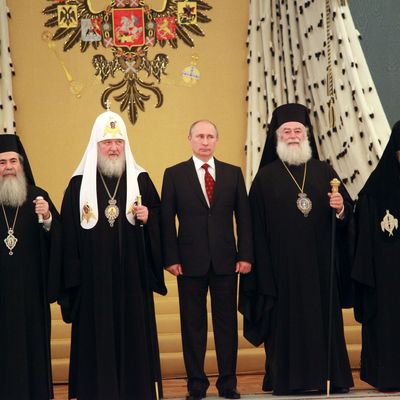
There are all sorts of theories about Donald Trump’s affinity for Vladimir Putin’s Russia, ranging from shadowy business dealings with Putin or pro-Putin entities, to Russia’s alleged material aid in promoting Trump’s presidential candidacy, to the personal affinity between two men who yearn for recognition as world-historical figures. A related question is why so many Republicans — who four years ago were cheering Mitt Romney’s prophecies of a new Cold War struggle with Russia — have accepted Trump’s Russophilia.
But as Peter Beinart points out at The Atlantic, there is actually a strain of conservatism in which a fondness for post-communist Russia and its leader are not at all out of place:
Civilizational conservatives like Jerry Falwell and Pat Buchanan saw the cold war as a struggle between two countries defined primarily by their view of God: The Judeo-Christian United States versus the atheistic Soviet Union. Ideological conservatives like Paul Wolfowitz and Elliot Abrams, by contrast, saw the cold war as a conflict between two countries defined primarily by their view of government: the liberty-loving United States versus the totalitarian USSR …
In the 1990s, after the Soviet Union collapsed, ideological conservatives and civilizational conservatives parted ways. The clearest example was the former Yugoslavia. In the 1990s, Serbs brutalized the largely Muslim breakaway republic of Bosnia. Ideological conservatives like Robert Kagan urged NATO to intervene in the name of human rights. Cultural conservatives like Buchanan wondered why the U.S. was going to war to defend Muslims against Christians.
That’s right, Donald Trump and his alt-right fanbase are hardly the only Americans who deeply admire Vladimir Putin: He has a fairly large fan club among politically active U.S. Christian conservatives.
It includes some pretty big names, like conservative Evangelical leader Franklin Graham, National Organization for Marriage leader Brian Brown, and American Family Association spokesperson Bryan Fischer. In almost every case it has been his distinctive combination of homophobia and Islamophobia that has made Putin one of the Christian right’s favorite international figures. The cultural conservative preference for authoritarian Christian Slavs who are fighting Muslims has, as Beinart notes, carried over from the Serbs to their traditional sponsors in Moscow, and most especially to the former KGB officer who has revived Russia’s pre-communist tradition of militantly traditionalist Christianity.
Putin’s attacks on “gay propaganda” have been particularly heartwarming to Christian-right folk, probably because of echoes they hear of their own longtime warnings about a sinister “homosexual agenda” pervading U.S. politics and culture. Here’s Franklin Graham gushing about this during a trip to Russia:
I very much appreciate that President Putin is protecting Russian young people against homosexual propaganda. If only to give them the opportunity to grow up and make a decision for themselves. Again, homosexuals cannot have children, they can take other people’s children. I believe that President Obama (and I’ll repeat, he’s a very nice person) is leading America down the wrong road. He’s taking a stand against God.
Meanwhile, Putin’s long war with Chechen Muslim separatists has earned him Christian admiration along the lines Beinart is talking about. And Russia’s long-standing partnership with Syria’s Assad regime — regarded as the protector of the country’s ancient if dwindling Christian minority, threatened by virtually every Islamic group in the region — has recently given Putin some additional Western Christian street cred. Putin’s own association with end-times speculation hasn’t hurt, either.
So the cultural conservative affinity with Putin’s Russia goes a little deeper, and is more religious in nature, than Beinart’s analysis suggests. But there is one problem in Russia that could drive a wedge between Trump and his conservative Evangelical fans: the tradition of Russian Orthodox Church intolerance toward competing Christian faith communities, which very recently popped back up in a law on proselytization signed by Putin in July:
Russian evangelicals are expressing alarm in light of President Vladmir Putin’s signing of a so-called anti-terrorism law last Thursday that imposes harsh restrictions on religious freedom by banning religious gatherings in homes as well as evangelism and missionary activities.
This law is one of the reasons conservative Evangelical writer Eric Metaxas, who got a lot of attention this fall for claiming that like-minded people had a religious obligation to vote for Donald Trump, isn’t buying into any “man-crush” when it comes to Putin:
It should be clear that the law has little, if anything, to do with defending Christianity and everything to do with Russian nationalism. As author David Aikman told Christianity Today, “The Russian Orthodox church is part of a bulwark of Russian nationalism stirred up by Vladimir Putin … Everything that undermines that action is a real threat, whether that’s evangelical Protestant missionaries or anything else.”
So there is a paradox at the center of Christian-right attitudes toward Putin’s Russia: His own conspicuous traditionalist Christianity, which makes him an ally against gay and Muslim agendas, makes him an enemy of conservative Evangelicals in his own country. Since Putin’s not likely to abandon his position favoring a near-monopoly for the Russian Orthodox Church, that makes him disappointing as a heartthrob for the Focus on Family crowd. But there’s still Donald Trump.






























